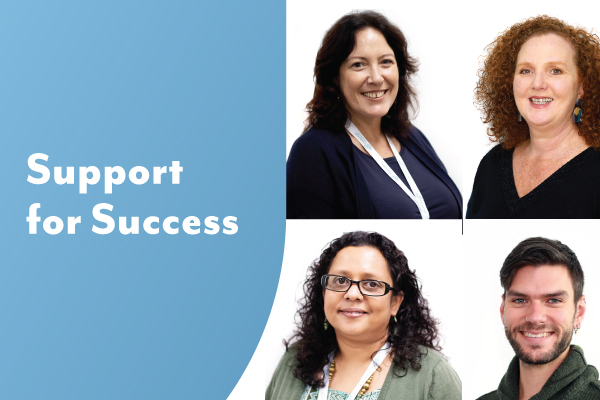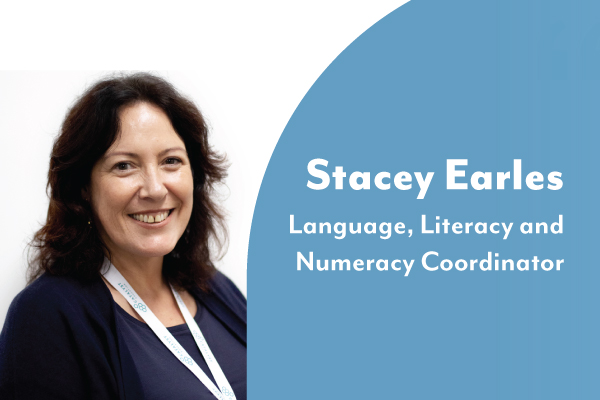Stress can impact your mental state, your physical state and your ability to focus and complete essential tasks.
When you’re studying, whether it’s aged care or early childhood education, and working hard to fit all your commitments in, stress is the last thing you need. Thankfully, there are techniques you can use to de-stress and manage your overall wellbeing to continue to achieve great outcomes in your studies and beyond.

Understanding stress
Stress is the body’s way of responding to perceived threats or danger around you. It is worth noting that stress is not just in your head — it is a physical response that involves your central nervous system altering your hormones to stimulate the body into action. In a real-life emergency this ‘fight or flight’ response could give you the sharpened reflexes you need and could even save your life. For many people though, the symptoms of feeling stressed can become yet another thing to stress about.
The experience of stress can be quite intense, affecting your body as well as the way your brain functions. Stress could present in many ways, including:
- Headaches
- An inability to focus
- Decreased energy
- Disrupted sleep
- Aches and pains
- Digestive issues
- Feelings of sadness or depression
- Agitation
Reducing stress in stressful times
As life in 2020 has seen many of us experience situations that could have resulted in increased stress, it’s important to learn how to get your body back into balance. Juggling your course with work, family and life in general can be overwhelming at times. And while you can’t necessarily get rid of the situations that cause stress, you can discover ways to better manage it so you can continue to achieve success in your studies.
Getting serious about organisation
To de-stress, you need to set yourself up for success. A big part of managing situations and commitments is by being organised. If you’re guilty of leaving things to the last minute or not allocating enough time to an assignment, then it’s time to plan ahead more effectively. Studying online gives you the freedom to work the way you like, so you could rethink the way you work — is having your study area on the couch in front of the television really the most logical workspace? Better time management can go a long way to help you feel less stressed by making you more productive and creating more time for you to fit everything in. Plus, take a look at our tips for studying online.
Try this: Write a weekly schedule. Having a set routine that is written out will help you visualise everything that needs to be done. Start by assessing how long it takes you (honestly!) to complete certain tasks. Schedule in your breaks and “me time” as well to ensure you maintain a sense of balance to hopefully prevent future overwhelm.
Focusing on your physical state
No matter how carefully you prioritise, sometimes things just don’t go to plan, or extra tasks pop up. Maybe an assignment took longer than you had hoped or you had an extra shift at work. Counteract the incoming stress by using physical relaxation techniques to tell your body: ‘everything is going to be alright’! There are many wellbeing strategies you can try, and almost any list you find will include movement and exercise. Exercise helps to regulate those stress hormones and get your body feeling more normal. Unstructured physical activities like gardening, walking with friends or cleaning the house could also help. Other options to shake off tension are bootcamps, strength training, running or yoga.
Try this: Create your own de-stress circuit. You can put it in your phone or stick it on the wall. For example:
- Do ten squats
- Do ten push ups
- Do a ten second plank
- One minute of star jumps
- Repeat three times.
Taking time to breath
Conscious breathing can be a powerful tool for relaxation and de-stressing. Deep breathing is often incorporated with movement, so you could look into yoga or pilates for added benefits and to de-stress further. Mindfulness is another approach that can aid in reducing the feeling of stress, as well as prevent it from taking over. Deep breathing and mindfulness as de-stressing techniques can also be useful in the workplace, with many benefits for residents in aged care as well as children in early childhood education.
Try this: Alternate Nostril Breathing Technique. Also known as Nadi Shodhan Pranayama, this breathing technique can be done anywhere and can calm the mind while helping to release tension. Follow these steps to commence this practice:
- Sit comfortably
- Bring your left hand on your left knee.
- Move your right hand up toward your face.
- Complete an exhale then close your right nostril over with your right thumb or index finger.
- Now, inhale through your left nostril. Once complete, close the left nostril and release the right nostril to exhale.
- Leaving the left nostril closed, inhale through the right nostril.
- Now, close the right nostril and open the left to exhale.
- Continue to do these cycles for a few minutes and finish with exhaling on the left side.
Regain control
Managing your mental health and wellbeing is important and can contribute to your training outcomes. Try out some of the suggestions listed above to de-stress then make note of which techniques work best for you. If you’re looking for more to try, consider these additional scientifically-backed approaches.
Your trainer and our Learner Success team are ready and willing to give you extra support in your studies to get on top of things. Don’t hesitate to reach out to Selmar and find out what your options are to ease stress.
Don’t let stress get the better of you. If stress continues to take over, it could be worth considering speaking with a health professional so that you can regain control to get the most out of your course, career and life.
At Selmar, we are dedicated to supporting you through your studies from start to finish. If you need any assistance, contact us with any question you may have.



